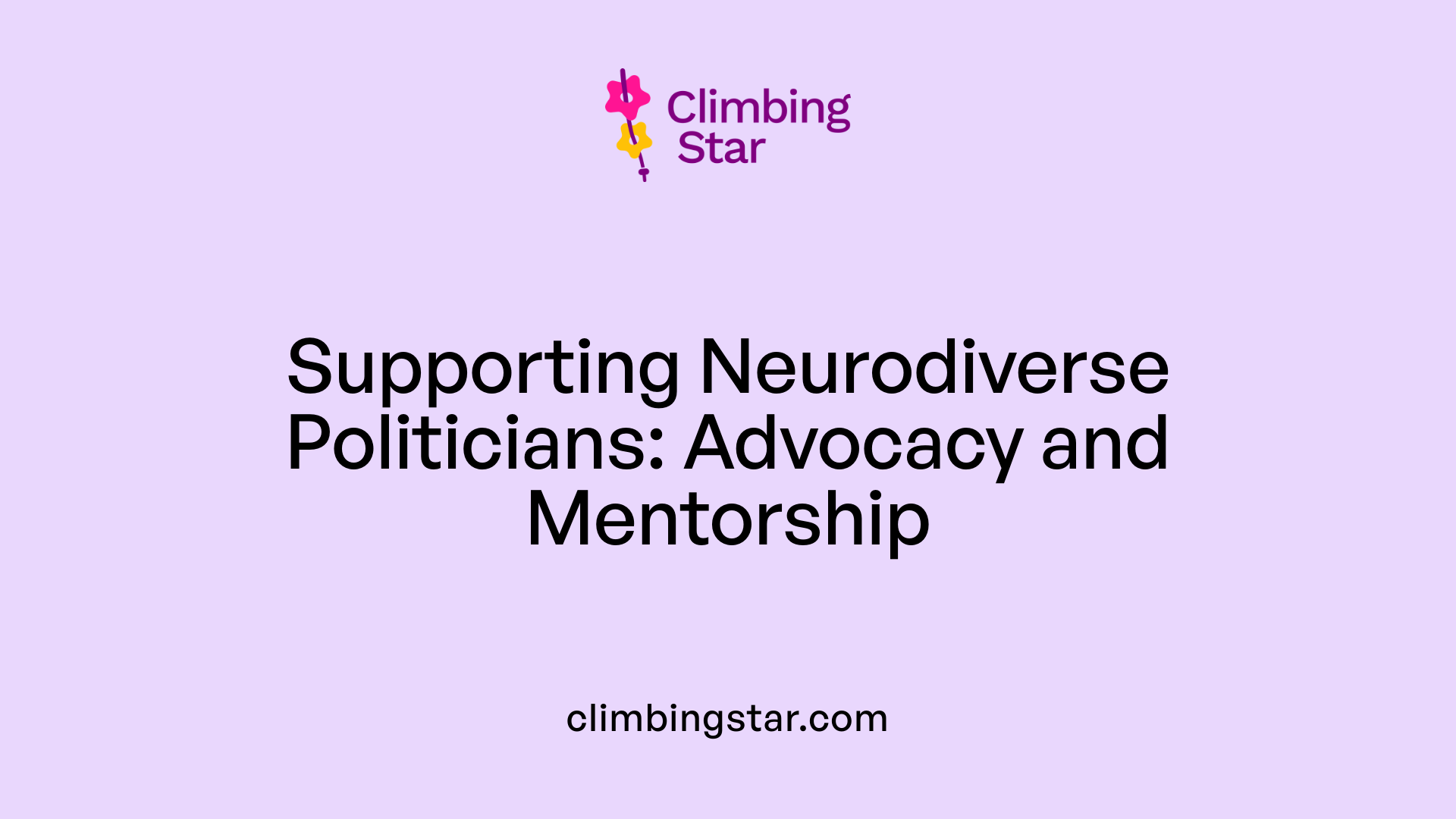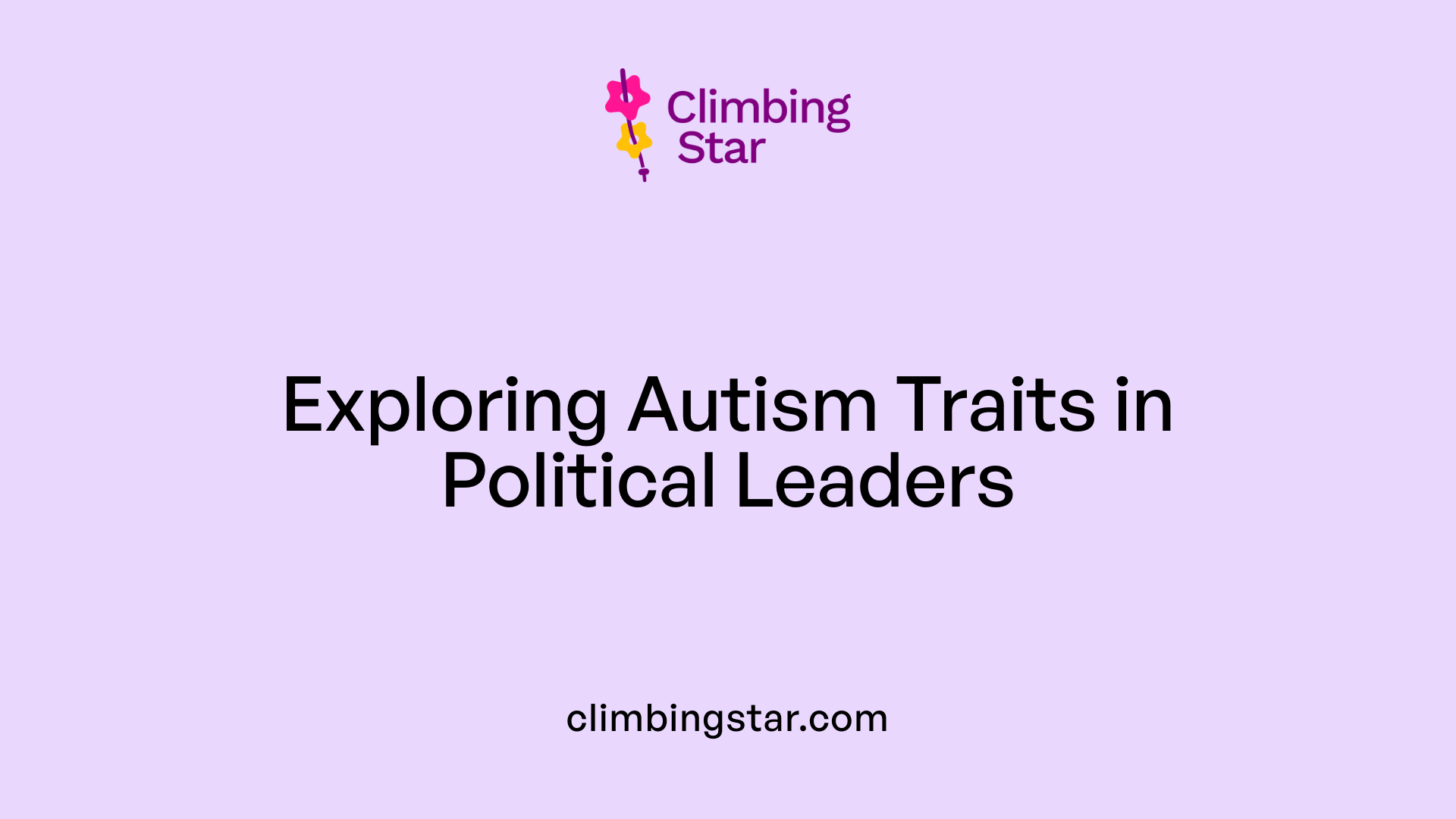Understanding Autism among Political Figures: An Insight into Neurodiverse Leadership
Autism spectrum disorder (ASD) has long been misunderstood or overlooked in many sectors, including politics. While societal stereotypes often focus on deficits, a growing body of evidence highlights the strengths and unique perspectives that neurodiverse individuals bring to leadership roles. This article delves into the lives of notable figures—real and attributed—who are believed or known to have autism, exploring their careers, achievements, and the impact of their neurodiversity on public service.
Historical and Notable Figures with Traits Suggestive of Autism
 Many prominent figures from history and modern times exhibit traits that are often associated with autism spectrum disorder (ASD). These traits include deep focus on specific interests, difficulties in social interactions, adherence to routines, and intense dedication to particular pursuits.
Many prominent figures from history and modern times exhibit traits that are often associated with autism spectrum disorder (ASD). These traits include deep focus on specific interests, difficulties in social interactions, adherence to routines, and intense dedication to particular pursuits.
For instance, Albert Einstein showed signs like delayed speech during childhood, deep concentration, and social difficulties, leading some researchers to suggest he may have been on the spectrum. Similarly, Sir Isaac Newton was known for his extreme focus, social avoidance, and rigid routines, characteristics that align with certain autistic traits.
In the contemporary world, several public figures have openly discussed their autism diagnoses or are widely believed to display autistic traits. Temple Grandin, diagnosed with autism, developed a remarkable ability to think visually, which she used to design humane livestock handling systems. Greta Thunberg, a well-known climate activist, has Asperger's syndrome and advocates that her autism helps her focus on her activism. Elon Musk has publicly shared that he has Asperger's, which influences his problem-solving skills and innovative thinking.
Other influential individuals include Dan Aykroyd and Susan Boyle, both diagnosed with Asperger's, who attribute their passions and perseverance to their neurodiversity. Actor Anthony Hopkins was diagnosed later in life with Asperger's, which he believes enhances his memory and acting depth. Even Tim Burton, the filmmaker celebrated for his distinctive storytelling, exhibits traits such as intense passion and social challenges, though he has not been formally diagnosed.
This pattern of traits is also reflected in historical and political figures. Georges Couthon, a leader during the French Revolution, was paraplegic and exhibited remarkable resilience. King Louis XVIII and Emperor Ferdinand I experienced paralysis or health conditions that impacted their mobility.
Modern politicians with disabilities also exemplify resilience. For example, Gabriela Michetti, the former Vice President of Argentina, used a wheelchair. Canadian legislator Steven Fletcher made history as the first quadriplegic Member of Parliament, advocating for accessibility and inclusion.
A broad spectrum of disabilities, including paraplegia, blindness, and limb amputations, have affected numerous leaders worldwide. These conditions often did not hinder their capacity to lead and make impactful decisions, demonstrating that ability and resilience often transcend physical limitations.
| Person | Notable Traits or Conditions | Impact/Contribution | Additional Notes |
|---|---|---|---|
| Albert Einstein | Delayed speech, focus, social difficulties | Revolutionized physics | Suggested autism traits by researchers |
| Sir Isaac Newton | Focus, social avoidance, routines | Foundations of calculus and physics | Known for intense focus |
| Temple Grandin | Autism, visual thinking | Designs for animal welfare | Advocate and problem solver |
| Greta Thunberg | Asperger's, intense focus | Climate activism | Describes her autism as a 'superpower' |
| Elon Musk | Asperger's | Innovation in tech and space | Influences problem-solving methods |
| Susan Boyle | Asperger's | Musical achievements | Inspiration for overcoming social challenges |
| Anthony Hopkins | Asperger's | Acting career | Finds that it aids his memory |
This demonstrates how traits traditionally associated with autism can be linked to extraordinary achievements and leadership throughout history and in modern times, highlighting the spectrum of human potential.
Prominent Modern Figures with Autism and Leadership Roles
How does autism impact a political career?
Autism spectrum disorder (ASD) can influence a politician's approach to leadership, communication, and decision-making. Those with autism often exhibit deep focus, honesty, and a unique perspective that can be highly beneficial in politics. However, they may also face challenges related to social interactions, sensory sensitivities, and traditional expectations for public engagement.
Many public figures with autism have demonstrated that these qualities can be turned into strengths. For example, Greta Thunberg, diagnosed with Asperger's syndrome, uses her focused passion on climate change to drive global activism. Elon Musk, who has publicly shared his diagnosis of Asperger's, approaches innovation and problem-solving with a distinctive perspective that has led to world-changing advancements.
Despite these strengths, societal perceptions and stigma may hinder some autistic individuals from fully participating in politics. Communication styles that differ from typical norms or social anxieties might be perceived as limitations, which could impact electoral success or political effectiveness.
To address these barriers, some institutions are considering more inclusive evaluation methods. These include standardized job simulations and general mental ability (GMA) tests that focus on skills and potential rather than traditional social skills assessments.
With increased awareness and appropriate support, autistic politicians can excel and even bring new insights to policymaking. Creating inclusive environments that value diversity—both neurodiversity and otherwise—can help unlock the leadership potential of many talented individuals.
| Public Figure | Autism Diagnosis | Contributions & Traits | Notable Impact |
|---|---|---|---|
| Greta Thunberg | Asperger’s syndrome | Focused climate activism, clear communication | Global environmental movement |
| Elon Musk | Asperger's | Innovative industry disruption, deep focus | Tesla, SpaceX |
| Temple Grandin | Autism (self-diagnosed) | Unique thinking in animal welfare, system design | Livestock handling innovations |
| Susan Boyle | Asperger’s in 2012 | Resilient singing career, perseverance | Inspiring performance stories |
| Chris Packham | Autism (diagnosed in 40s) | Naturalist and TV presenter with deep environmental focus | Increased awareness of neurodiversity |
This inclusion of diverse perspectives demonstrates that autism, rather than being solely a limitation, can serve as a catalyst for innovative and impactful leadership. As society progresses, fostering understanding and accommodation will be essential for harnessing the full potential of individuals on the autism spectrum in political roles.
Achievements and Contributions of Politicians with Autism

What are the achievements of politicians with autism?
Politicians with autism have made remarkable strides in advocacy, legislation, and leadership, continually challenging perceptions about their potential. For instance, Xavier DeGroat, diagnosed with autism, broke ground by becoming the first person with autism to intern at the White House. His experience not only set a precedent but also led to initiatives aimed at improving support systems for individuals on the autism spectrum.
Throughout history, many figures exhibiting traits associated with autism have contributed enormously to society. Benjamin Banneker, an African-American scientist and surveyor in the 18th century, and Charles Darwin, the father of evolution theory, are believed to have displayed characteristics aligned with autism spectrum disorder (ASD). Their dedication, meticulous attention to detail, and persistent curiosity enabled groundbreaking discoveries and advancements.
Modern political figures with autism often leverage traits like intense focus, honesty, perseverance, and a unique way of thinking to influence policy and public discourse. Greta Thunberg, with her Asperger's diagnosis, has become a leading voice in climate activism, demonstrating how her 'superpower' enhances her ability to focus intensely on critical issues. Similarly, Elon Musk openly shares his Asperger's diagnosis, which he credits as a catalyst for his innovative approach to technology and space exploration.
Other figures, such as musician and actor Dan Aykroyd and singer Susan Boyle, are celebrated for their perseverance and talent despite their diagnoses, inspiring countless individuals. These stories exemplify how autism can be intertwined with extraordinary abilities, fostering leadership and societal change.
| Person | Contribution | Key Traits | Impact |
|---|---|---|---|
| Xavier DeGroat | Interning at White House, autism advocacy | Dedication, leadership | Influenced autism legislation |
| Greta Thunberg | Climate activism | Focus, passion, advocacy | Accelerated global climate initiatives |
| Elon Musk | Innovation in tech and space | Creativity, focus | Revolutionized transportation and space industries |
| Dan Aykroyd | Elevating awareness of neurodiversity | Fascination, humor | Increased public understanding of Asperger’s |
| Susan Boyle | Inspiring perseverance in arts | Resilience, talent | Broadened acceptance for neurodiverse artists |
This overview illustrates that individuals with autism in political and influential roles have achieved breakthroughs in various fields. Their unique perspectives and strengths continue to break down stereotypes and pave the way for greater diversity in leadership.
| Notable Figures | Autism Traits | Leadership Achievements | Societal Impact |
|---|---|---|---|
| Xavier DeGroat | Dedication, focus | Legislative influence | Improved autism support policies |
| Greta Thunberg | Passion, focus | Global activism | Raised awareness on climate issues |
| Elon Musk | Creativity, perseverance | Industry innovation | Technological advancements |
| Dan Aykroyd | Intense fascination | Public awareness, education | Neurodiversity acceptance |
Overall, these examples affirm that autism can complement traits necessary for remarkable leadership, influence, and societal contribution, inspiring future generations.
Prevalence of Autism among Political Leaders and Public Figures
There is limited publicly available data on how common autism is among political leaders and influential public figures. Unlike in clinical settings, comprehensive studies on autism prevalence within this specific group are scarce. Many leaders do not disclose personal health conditions, including neurological differences, which makes it difficult to gauge exact numbers.
However, various high-profile disclosures highlight that some well-known individuals, spanning across different fields, have openly shared their autism diagnoses. For instance, Elon Musk revealed in 2021 that he has Asperger's syndrome, bringing awareness to how neurodivergence can coexist with leadership roles and innovation.
Other prominent figures include actor and musician Anthony Hopkins, who was diagnosed with Asperger’s later in life and credits it with aiding his memory and focus. Singer Susan Boyle was diagnosed with Asperger’s in 2012, and she credits her perseverance in her career to her unique talents. Environmental activist Greta Thunberg has spoken openly about having Asperger’s, calling it her 'superpower' that helps her concentrate intensely on climate change issues.
These examples suggest that autism and related traits such as exceptional focus, creative thinking, and social difficulties are present among influential personalities, including those in leadership positions. However, these cases are anecdotal and do not provide concrete statistics.
In the realm of politics, some leaders and politicians are believed or known to have neurological differences or disabilities—though often without formal disclosures or diagnoses. The overall impression is that autism might be more common in influential circles than publicly recognized, but the lack of systemic data prevents concrete conclusions.
In summary, while some high-profile disclosures show that autism exists among leadership and public figures, the true prevalence remains uncertain due to limited data. More research and openness would help better understand how widespread autism is within this influential population.
Below is a simplified overview of some known cases:
| Person | Autism Spectrum-Related Diagnosis | Notable Traits | Field of Influence |
|---|---|---|---|
| Elon Musk | Asperger’s syndrome | Focus, innovation | Technology, Business |
| Anthony Hopkins | Asperger’s (later diagnosis) | Memory, dedication | Acting |
| Susan Boyle | Asperger’s | Talent, perseverance | Music |
| Greta Thunberg | Asperger’s | Concentration, activism | Environmental activism |
Understanding how autism manifests in many influential figures could inspire more inclusive perceptions of neurodiversity. Although detailed statistics are lacking, it appears that traits associated with autism can contribute positively to leadership qualities such as problem-solving, creativity, and focus.
Why Recognizing Autism in Politics Matters
Why is understanding autism important in the context of politics?
Understanding autism is vital for fostering a political environment that values diversity and inclusivity. When politicians and policymakers are aware of autism, they can develop laws and initiatives that accommodate neurodiverse individuals, ensuring equal participation in democratic processes.
Autistic traits such as intense focus, social difficulties, and unique ways of thinking are often evident in influential leaders, including historical figures like Sir Isaac Newton and modern icons such as Elon Musk and Greta Thunberg. Recognizing these traits helps the public and officials appreciate the contributions of neurodiverse individuals, who may think differently but offer innovative perspectives.
This awareness can lead to better support systems, accessible public services, and policies that address the specific needs of autistic citizens. For example, understanding the importance of communication accommodations or sensory-friendly environments can make political participation more accessible.
Moreover, acknowledging autism challenges stereotypes and reduces stigma. When society sees successful figures with autistic traits, it expands perceptions of what neurodiverse individuals can achieve, inspiring more to pursue leadership roles.
Promoting neurodiversity in governance enriches decision-making and encourages diversity of thought. It broadens the scope of leadership qualities appreciated in political figures and champions a more equitable society where everyone has the opportunity to contribute.
In summary, understanding autism is a cornerstone of creating fair, empathetic, and inclusive political systems. It empowers neurodiverse individuals to step into leadership roles and influences societal attitudes toward autism and neurodiversity overall.
Impact of Autism on Decision-Making and Leadership Style

How does autism impact a political career?
Autism can greatly shape how individuals approach leadership roles and decision-making. Many autistic people possess traits such as honesty, attention to detail, perseverance, and a strong sense of integrity. These qualities can translate into effective, transparent leadership and a consistent commitment to their values.
However, autism also brings challenges that can affect a political career. Social difficulties may make public speaking and informal interactions harder, which are often essential in politics. Sensory sensitivities might make crowded events or loud environments overwhelming, impacting daily engagements.
Despite these difficulties, many autistic politicians have thrived by leveraging their unique strengths. Their rigor and focus often lead to meticulous policy analysis and a principled approach to governance. Yet, societal perceptions and stigma can sometimes hinder their progress or willingness to disclose their condition.
To foster inclusivity, governments and political organizations are increasingly adopting fair assessment methods. Standardized evaluations, like job simulations or General Mental Ability (GMA) tests, help identify abilities beyond conventional interviews, thus reducing barriers for autistic candidates.
With proper support and accommodations, autistic individuals are capable of substantial contributions to politics. Their different perspectives can enrich policymaking, especially in areas requiring honesty, precision, and perseverance.
Traits like honesty, attention to detail, perseverance, and integrity often associated with autistic individuals.
| Trait | Description | Impact on Leadership |
|---|---|---|
| Honesty | Tendency to be truthful and transparent | Builds trust among colleagues and constituents |
| Attention to Detail | Focused on accuracy and specifics | Ensures thorough policy analysis |
| Perseverance | Persistent in pursuit of goals | Drives long-term projects and reforms |
| Integrity | Strong moral principles | Enhances credibility and ethical standards |
More insights about Autism and Leadership
Exploring how autism influences leadership styles helps recognize the diverse strengths autistic individuals bring to the political arena. Their unique traits often support innovative problem-solving and candid communication.
Search phrase: 'autism influence on leadership and decision-making' can guide further exploration into this impactful topic.
Challenges Faced by Politicians with Autism and Disabilities

Why is understanding autism important in the context of politics?
Grasping the nuances of autism is vital for fostering an inclusive political landscape. When policymakers understand autism, they can design policies that better accommodate neurodiverse individuals, enabling their participation in governance on equal footing.
Many politicians and public figures with autism or disabilities, such as Sir Isaac Newton, Temple Grandin, and Greta Thunberg, have demonstrated that neurodiversity can contribute uniquely to leadership and innovation. Recognizing this broadens societal perceptions and helps reduce stigma.
However, individuals with autism often face societal misconceptions, stigmatization, and environmental barriers that make their political engagement more challenging. Stereotypes may lead some to underestimate their capabilities or overlook their potential contributions.
In political environments, accessible communication, sensory-friendly meeting spaces, and supportive attitudes are essential. Without these accommodations, many talented neurodiverse individuals might find it difficult to participate fully.
Promoting awareness and understanding creates a more empathetic approach, encouraging the inclusion of neurodiverse leaders. This not only enriches the diversity of perspectives in politics but also inspires others with autism to consider leadership roles.
Societal perceptions, stigma, and the need for accommodations in political environments
Society often perceives autism through a narrow lens that emphasizes deficits rather than strengths. This stigma can influence public and peer attitudes, leading to social isolation or discrimination.
In political settings, this stigma may manifest as doubts about an individual's ability to perform complex tasks, think critically, or connect socially with colleagues and constituents.
Accommodations such as flexible schedules, clear communication protocols, and sensory considerations can significantly help autistic politicians navigate the political arena.
Moreover, openly acknowledging and supporting neurodiversity in politics can challenge stereotypes and promote acceptance. Celebrating figures like Greta Thunberg and Dan Aykroyd highlights the strengths brought by neurodiverse individuals.
In sum, fostering an environment where autistic politicians are understood, respected, and supported advances not only justice but also enhances democratic representation. Creating such inclusive spaces ensures that diverse talents and perspectives contribute meaningfully to policymaking and leadership.
The Role of Advocacy and Support Networks for Politicians with Autism

Why is advocacy, mentorship, and support important for autistic politicians?
Supporting politicians with autism is vital for fostering inclusive and effective leadership. When individuals with autism receive proper backing, they can leverage their unique strengths to make meaningful societal contributions.
Mentorship programs, advocacy groups, and peer support networks offer essential guidance, advice, and encouragement. These platforms help navigate the challenges faced by autistic individuals in the political sphere, such as communication barriers or social difficulties.
By increasing awareness and understanding through advocacy, society can reduce stereotypes and promote acceptance. This environment empowers more autistic people to pursue and succeed in political careers.
How do these support systems enable success?
Support networks provide tailored resources, training, and mentorship opportunities that help develop essential skills for politics, such as public speaking, negotiation, and policy analysis.
They also create spaces for shared experiences, allowing autistic politicians to learn from others with similar profiles and develop resilience. These networks facilitate connections with allies and policymakers, amplifying their influence.
Examples of achievements and influence
The accomplishments of autistic politicians are inspiring. For instance, Xavier DeGroat, who was diagnosed with autism, was the first person with autism to intern at the White House. He later led initiatives improving autism support and influenced related legislation.
Throughout history, individuals with traits associated with autism, like dedication and attention to detail, have made profound contributions. These include figures like Benjamin Banneker and Charles Darwin, whose work reshaped science and understanding.
In today's political landscape, support systems continue to enable figures such as Greta Thunberg, whose autism is seen as a 'superpower' that enhances her focus and determination in climate activism.
What can society do to better support autistic politicians?
Expanding advocacy groups, fostering mentorship opportunities, and creating inclusive policies can greatly improve the success rates of autistic individuals in politics. Education campaigns to raise awareness about autism’s strengths and challenges will help build a more accepting environment.
In conclusion, the efforts of advocacy and support networks play an indispensable role in empowering autistic politicians. Their achievements demonstrate the importance of inclusivity and understanding in shaping diverse leadership that benefits society as a whole.
Behavioral Traits Associated with Autism in Leaders and Politicians

How does autism impact a political career?
Autism can shape the way politicians communicate, make decisions, and interact socially. Traits such as deep focus, high attention to detail, perseverance, and honesty are often observed. These qualities can be tremendous assets in leadership roles, helping individuals stay dedicated to their goals and maintain integrity.
However, autism also presents certain challenges. Social difficulties, such as discomfort with informal networking or public speaking, might hinder traditional promotional efforts and interactions. Sensory sensitivities could make crowded or noisy environments overwhelming. Societal perceptions and stigma may discourage disclosure of autism, which can limit access to support systems or accommodations.
Despite these hurdles, many autistic individuals in politics have demonstrated that their traits are advantageous. For example, their ability to concentrate deeply allows for thorough policy analysis, and their honesty can foster trust among constituents.
From a broader perspective, governments and organizations are increasingly recognizing the importance of inclusive hiring and evaluation processes. Standardized assessments like job simulations and general mental ability (GMA) tests help fairly evaluate autistic candidates' skills, reducing traditional barriers.
With growing societal awareness and tailored support, autistic politicians can leverage their unique perspectives to contribute meaningfully to policymaking. Their experiences often bring insights into issues like mental health, disability rights, and social justice, enriching the legislative process.
This evolving understanding underscores that autism, beyond challenges, can be viewed as a source of strength in leadership roles, fostering innovation and integrity in governance.
| Trait | Impact on Politics | Notable Examples |
|---|---|---|
| Deep Focus | Enables detailed policy work | Albert Einstein's traits associated with autism |
| Honesty | Builds public trust | Susan Boyle's perseverance and authenticity |
| Social Difficulties | May hinder networking but can improve focus | Sir Isaac Newton's social avoidance traits |
| Attention to Detail | Ensures thorough legislative review | Satoshi Tajiri's childhood fascination inspiring creative work |
| Perseverance | Maintains long-term commitment | Greta Thunberg's climate activism |
Understanding these traits helps create a more inclusive environment where diverse talents contribute to governance and societal progress.
Conclusion: Embracing Neurodiversity in Leadership Roles
Recognizing and supporting neurodiverse individuals in political positions is essential for fostering an inclusive and dynamic society. Many individuals with traits associated with autism and other neurodivergent conditions have demonstrated exceptional abilities, such as deep focus, innovative thinking, and resilience. For example, prominent figures like Sir Isaac Newton, who may have exhibited autistic traits, and Temple Grandin, who used her unique perspective to revolutionize livestock handling, exemplify how neurodiversity can lead to groundbreaking achievements.
Encouraging neurodiversity in politics not only broadens the spectrum of ideas and problem-solving approaches but also promotes empathy and understanding across communities. When policymakers understand autism and related conditions, they can craft legislation that better addresses accessibility, education, and employment support, benefiting society as a whole.
Inclusive leadership also challenges stereotypes and stigmas, inspiring more neurodiverse individuals to pursue careers in governance. This inclusivity ensures that perspectives from various neurotypes are represented, fostering a more equitable and innovative political landscape.
Ultimately, embracing neurodiversity in leadership enriches governance, drives societal progress, and underscores the importance of valuing all forms of human diversity.
What is the importance of recognizing and supporting neurodiverse individuals in politics, and how does this inclusivity benefit society?
Supporting neurodiverse politicians helps create policies that promote equality, understanding, and accessibility. It encourages a variety of perspectives that can lead to more creative and effective solutions to societal challenges. This approach nurtures a more empathetic and representative democracy, where diversity is celebrated and harnessed for collective growth.
Fostering Neurodiversity for a Stronger Democracy
The landscape of political leadership is enriched when neurodiverse individuals, especially those with autism, are recognized and supported. Their unique perspectives, unwavering focus, and honesty contribute to a more diverse and resilient governance. Promoting awareness, providing necessary accommodations, and dismantling stereotypes will ensure that neurodiversity is celebrated as a strength rather than a barrier. The examples and discussions outlined in this article underscore the need for a broader acceptance of different minds in leadership roles, ultimately fostering a culture of inclusivity and innovation in politics.
References
- Ten Famous People with Autism Who Inspire the World
- 20 Famous People With Autism
- List of physically disabled politicians
- Autism and the Case Against Job Interviews | Neuroethics
- Autism disclosure – The decisions autistic adults make
- 10 Famous People with Autism Spectrum Disorder
- Neurodivergence is a career maker for men like Elon Musk ...
- Autistic celebrities: 71 famous people with autism (2023 ...






